Here are my favorite poems about acceptance categorized:
- Short poems about acceptance
- Famous poems about acceptance
- Poems about acceptance in life
- Poems about acceptance of death
- Famous poems about accepting yourself
- Poems about acceptance of others
So if you want the best poems about acceptance, then you’re in the right place.
Let’s get right into it!
- 57 Joyful Poems About Gratefulness
- 53 Enchanting Poems About Peace
- 25 Soothing Poems About Calmness
- 67 Bittersweet Poems About Nostalgia
- 69 Euphoric Poems About Happiness
- 67 Heartening Poems About Hope
- 43 Invigorating Poems About Smiles
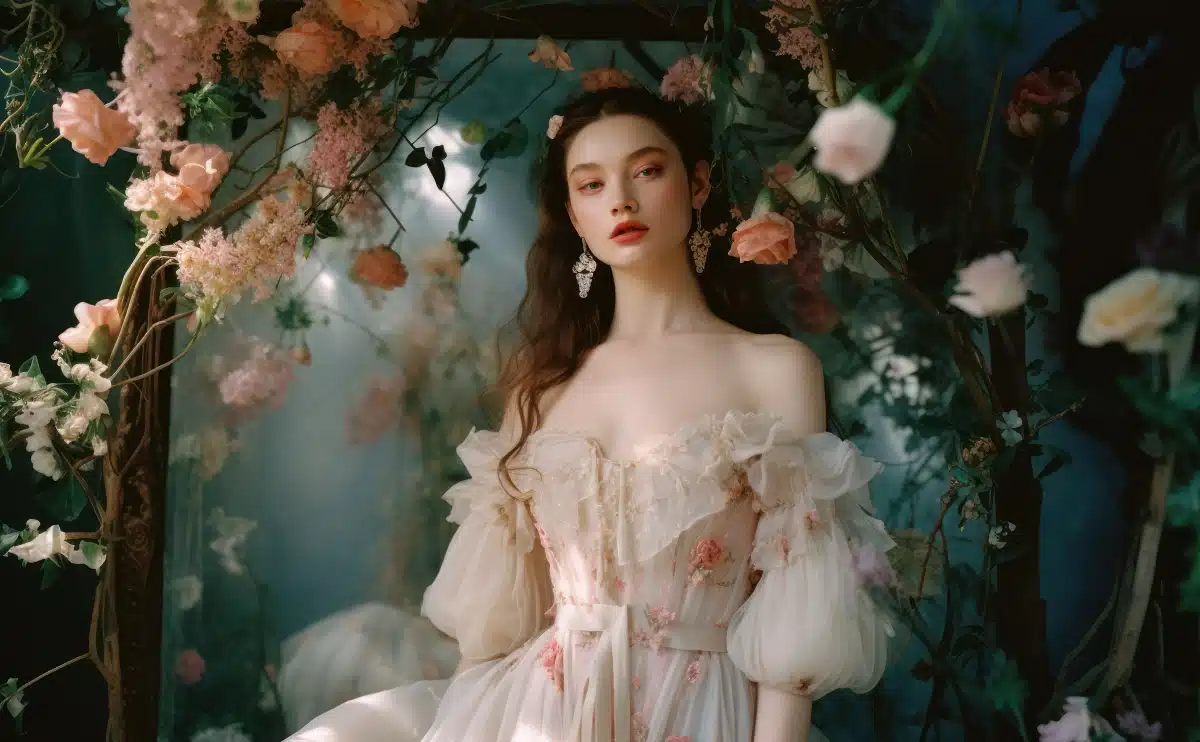
Endearing Poems About Acceptance

Step into the realm of acceptance with this captivating collection of poems that will ignite your imagination and touch your heart.
Within this collection, you will discover a rich tapestry of verses that explore the beauty and power of acceptance in all its forms.
Carefully curated, each poem evokes connection and understanding.
Whether you’re a poetry enthusiast or seeking self-discovery, join me in this extraordinary journey through the power of words and witness the magic of acceptance unfold.
Let’s jump right in!
My #1 Favorite Poem About Acceptance

“Acceptance.” by Emma Lazarus
Yea, she hath looked Truth grimly face to face,
And drained unto the lees the proffered cup.
This silence is not patience, nor the grace
Of recognition, meekly offered up,
But mere acceptance fraught with keenest pain,
Seeing that all her struggles must be vain.
Her future clear and terrible outlies, –
This burden to be borne through all her days,
This crown of thorns pressed down above her eyes,
This weight of trouble she may never raise.
No reconcilement doth she ask nor wait;
Knowing such things are, she endures her fate.
No brave endeavor of the broken will
To cling to such poor stays as will abide
(Although the waves be wild and angry still)
After the lapsing of the swollen tide.
No fear of further loss, no hope of gain,
Naught but the apathy of weary pain.
Why “Acceptance” Is My Favorite Poem About Acceptance

Picture this: You’re sitting in a cozy café, sipping on your favorite cup of coffee while this poem warms you up like a hug from the universe telling you that no matter who you are, you are accepted.
With the poem, Emma Lazarus knew how to capture the essence of acceptance in her words.
She weaves together these beautiful verses that remind me that our differences make us unique and special.
When you read this poem, a burst of joy just fills your heart, it’s like a permission slip to be yourself unapologetically.
So, if you’re looking for a poem that will make you feel all warm and fuzzy inside, “Acceptance” by Emma Lazarus is the one for you.
Short Poems About Acceptance

Embark on a journey of embracing differences and finding peace within yourself with these short poems about acceptance that weave together the beauty of diversity and self-acceptance in a few lines.
Experience the profound impact of embracing acceptance and celebrating individuality through the heartfelt verses of these poignant poems.
“Ebb” by Edna St. Vincent Millay
I know what my heart is like
Since your love died:
It is like a hollow ledge
Holding a little pool
Left there by the tide,
A little tepid pool,
Drying inward from the edge.
“Acceptance” by Robert Frost
When the spent sun throws up its rays on cloud
And goes down burning into the gulf below,
No voice in nature is heard to cry aloud
At what has happened. Birds, at least must know
It is the change to darkness in the sky.
Murmuring something quiet in her breast,
One bird begins to close a faded eye;
Or overtaken too far from his nest,
Hurrying low above the grove, some waif
Swoops just in time to his remembered tree.
At most he thinks or twitters softly, ‘Safe!
Now let the night be dark for all of me.
Let the night bee too dark for me to see
Into the future. Let what will be, be.’
“Parting” by Emily Dickinson
My life closed twice before its close;
It yet remains to see
If Immortality unveil
A third event to me,
So huge, so hopeless to conceive,
As these that twice befell.
Parting is all we know of heaven,
And all we need of hell.

“Acceptation” by John Eglinton
Establish in some better way
My life, thou Godhead! that I may
Know it as virtue ranks
To scorn Thy gifts, or give Thee thanks.
For now I feel Thee near, unsought.
But why, when I seemed worth Thy thought,
High—souled, impatient for a task—
Why not have called me then, I ask?
No mountings of the spirit please;
Thou dost accept our dregs and lees;
The wise are they that feel Thy rod,
And grief alone is near to God.
“The Cross of Snow” by Henry Wadsworth Longfellow
In the long, sleepless watches of the night,
A gentle face–the face of one long dead–
Looks at me from the wall, where round its head
The night-lamp casts a halo of pale light.
Here in this room she died; and soul more white
Never through martyrdom of fire was led
To its repose; nor can in books be read
The legend of a life more benedight.
There is a mountain in the distant West
That, sun-defying, in its deep ravines
Displays a cross of snow upon its side.
Such is the cross I wear upon my breast
These eighteen years, through all the changing scenes
And seasons, changeless since the day she died.
“Acceptance” by Willard Wattles
I cannot think nor reason,
I only know he came
With hands and feet of healing
And wild heart all aflame.
With eyes that dimmed and softened
At all the things he saw,
And in his pillared singing
I read the marching Law.
I only know he loves me,
Enfolds and understands—
And oh, his heart that holds me,
And oh, his certain hands!
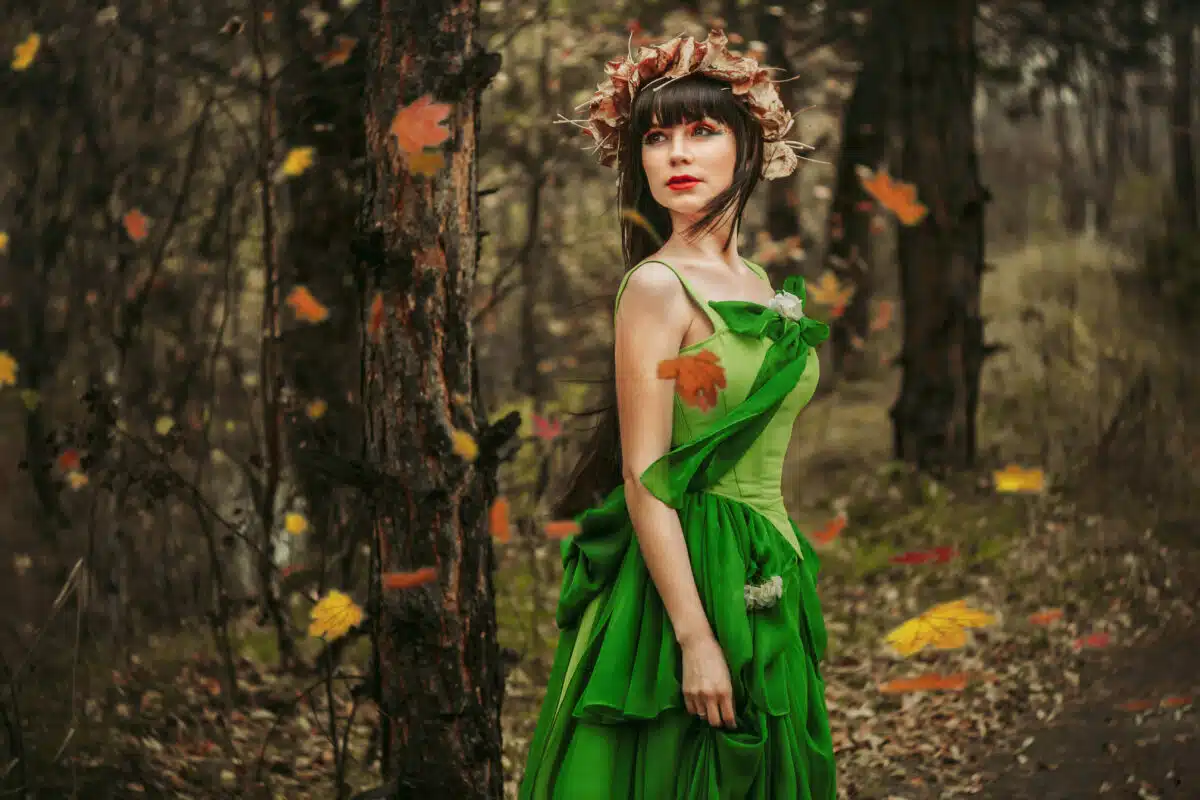
“Lines Written At Thorp Green” by Anne Bronte
That summer sun, whose genial glow
Now cheers my drooping spirit so
Must cold and distant be,
And only light our northern clime
With feeble ray, before the time
I long so much to see.
And this soft whispering breeze that now
So gently cools my fevered brow,
This too, alas, must turn
To a wild blast whose icy dart
Pierces and chills me to the heart,
Before I cease to mourn.
And these bright flowers I love so well,
Verbena, rose and sweet bluebell,
Must droop and die away.
Those thick green leaves with all their shade
And rustling music, they must fade
And every one decay.
But if the sunny summer time
And woods and meadows in their prime
Are sweet to them that roam
Far sweeter is the winter bare
With long dark nights and landscapes drear
To them that are at Home!
“The Dream” by Edna St. Vincent Millay
Love, if I weep it will not matter,
And if you laugh I shall not care;
Foolish am I to think about it,
But it is good to feel you there.
Love, in my sleep I dreamed of waking,–
White and awful the moonlight reached
Over the floor, and somewhere, somewhere,
There was a shutter loose,–it screeched!
Swung in the wind,–and no wind blowing!–
I was afraid, and turned to you,
Put out my hand to you for comfort,–
And you were gone! Cold, cold as dew,
Under my hand the moonlight lay!
Love, if you laugh I shall not care,
But if I weep it will not matter,–
Ah, it is good to feel you there!
“The Old Stoic” by Emily Bronte
Riches I hold in light esteem,
And Love I laugh to scorn;
And lust of fame was but a dream,
That vanished with the morn:
And if I pray, the only prayer
That moves my lips for me
Is, “Leave the heart that now I bear,
And give me liberty!”
Yes, as my swift days near their goal:
‘Tis all that I implore;
In life and death a chainless soul,
With courage to endure.

“Love (III)” by George Hebert
Love bade me welcome: yet my soul drew back,
Guilty of dust and sin.
But quick-eyed Love, observing me grow slack
From my first entrance in,
Drew nearer to me, sweetly questioning
If I lacked anything.
“A guest,” I answered, “worthy to be here”:
Love said, “You shall be he.”
“I, the unkind, ungrateful? Ah, my dear,
I cannot look on thee.”
Love took my hand, and smiling did reply,
“Who made the eyes but I?”
“Truth, Lord; but I have marred them; let my shame
Go where it doth deserve.”
“And know you not,” says Love, “who bore the blame?”
“My dear, then I will serve.”
“You must sit down,” says Love, “and taste my meat.”
So I did sit and eat.
Famous Poems About Acceptance

Step into the world of embracing life’s twists and turns with this delightful selection of famous poems about acceptance.
These captivating verses will sweep you away, teaching readers that sometimes the beauty lies in letting go and embracing what is.
“O” by Mary Sidney Herbert
Oh, what a lantern, what a lamp of light
Is thy pure word to me
To clear my paths and guide my goings right!
I swore and swear again,
I of the statutes will observer be,
Thou justly dost ordain.
The heavy weights of grief oppress me sore:
Lord, raise me by the word,
As thou to me didst promise heretofore.
And this unforced praise
I for an off’ring bring, accept, O Lord,
And show to me thy ways.
What if my life lie naked in my hand,
To every chance exposed!
Should I forget what thou dost me command?
No, no, I will not stray
From thy edicts though round about enclosed
With snares the wicked lay.
Thy testimonies as mine heritage,
I have retained still:
And unto them my heart’s delight engage,
My heart which still doth bend,
And only bend to do what thou dost will,
And do it to the end.
“A Psalm of Life. What the Heart of the Young Man Said to the Psalmist.” by Henry Wadsworth Longfellow
Tell me not, in mournful numbers,
Life is but an empty dream!
For the soul is dead that slumbers,
And things are not what they seem.
Life is real! Life is earnest!
And the grave is not its goal;
Dust thou art, to dust returnest,
Was not spoken of the soul.
Not enjoyment, and not sorrow,
Is our destined end or way;
But to act, that each to-morrow
Find us farther than to-day.
Art is long, and Time is fleeting,
And our hearts, though stout and brave,
Still, like muffled drums, are beating
Funeral marches to the grave.
In the world’s broad field of battle,
In the bivouac of Life,
Be not like dumb, driven cattle!
Be a hero in the strife!
Trust no Future, howe’er pleasant!
Let the dead Past bury its dead!
Act,–act in the living Present!
Heart within, and God o’erhead!
Lives of great men all remind us
We can make our lives sublime,
And, departing, leave behind us
Footprints on the sands of time;–
Footprints, that perhaps another,
Sailing o’er life’s solemn main,
A forlorn and shipwrecked brother,
Seeing, shall take heart again.
Let us, then, be up and doing,
With a heart for any fate;
Still achieving, still pursuing,
Learn to labor and to wait.
“An Evening Thought: Salvation by Christ, with Penitential Cries” by Jupiter Hammon
Salvation comes by Christ alone,
The only Son of God;
Redemption now to every one,
That love his holy Word.
Dear Jesus, we would fly to Thee,
And leave off every Sin,
Thy tender Mercy well agree;
Salvation from our King.
Salvation comes now from the Lord,
Our victorious King.
His holy Name be well ador’d,
Salvation surely bring.
Dear Jesus, give thy Spirit now,
Thy Grace to every Nation,
That han’t the Lord to whom we bow,
The Author of Salvation.
Dear Jesus, unto Thee we cry,
Give us the Preparation;
Turn not away thy tender Eye;
We seek thy true Salvation.
Salvation comes from God we know,
The true and only One;
It’s well agreed and certain true,
He gave his only Son.
Lord, hear our penetential Cry:
Salvation from above;
It is the Lord that doth supply,
With his Redeeming Love.
Dear Jesus, by thy precious Blood,
The World Redemption have:
Salvation now comes from the Lord,
He being thy captive slave.
Dear Jesus, let the Nations cry,
And all the People say,
Salvation comes from Christ on high,
Haste on Tribunal Day.
We cry as Sinners to the Lord,
Salvation to obtain;
It is firmly fixed, his holy Word,
Ye shall not cry in vain.
Dear Jesus, unto Thee we cry,
And make our Lamentation:
O let our Prayers ascend on high;
We felt thy Salvation.
Lord, turn our dark benighted Souls;
Give us a true Motion,
And let the Hearts of all the World,
Make Christ their Salvation.
Ten Thousand Angels cry to Thee,
Yea, louder than the Ocean.
Thou art the Lord, we plainly see;
Thou art the true Salvation.
Now is the Day, excepted Time;
The Day of the Salvation;
Increase your Faith, do not repine:
Awake ye, every Nation.
Lord, unto whom now shall we go,
Or seek a safe abode?
Thou has the Word Salvation Too,
The only Son of God.
Ho! every one that hunger hath,
Or pineth after me,
Salvation be thy leading Staff,
To set the Sinner free.
Dear Jesus, unto Thee we fly;
Depart, depart from Sin,
Salvation doth at length supply,
The Glory of our King.
Come, ye Blessed of the Lord,
Salvation greatly given;
O turn your Hearts, accept the Word,
Your Souls are fit for Heaven.
Dear Jesus, we now turn to Thee,
Salvation to obtain;
Our Hearts and Souls do meet again,
To magnify thy Name.
Come, Holy Spirit, Heavenly Dove,
The Object of our Care;
Salvation doth increase our Love;
Our Hearts hath felt they fear.
Now Glory be to God on High,
Salvation high and low;
And thus the Soul on Christ rely,
To Heaven surely go.
Come, Blessed Jesus, Heavenly Dove,
Accept Repentance here;
Salvation give, with tender Love;
Let us with Angels share. Finis.

“Accepted” by Elizabeth Jennings
You are no longer young,
Nor are you very old.
There are homes where those belong.
You know you do not fit
When you observe the cold
Stares of those who sit
In bath-chairs or the park
(A stick, then, at their side)
Or find yourself in the dark
And see the lovers who,
In love and in their stride,
Don’t even notice you.
This is a time to begin
Your life. It could be new.
The sheer not fitting in
With the old who envy you
And the young who want to win,
Not knowing false from true,
Means you have liberty
Denied to their extremes.
At last now you can be
What the old cannot recall
And the young long for in dreams,
Yet still include them all.
“The Village Blacksmith” by Henry Wadsworth Longfellow
Under a spreading chestnut-tree
The village smithy stands;
The smith, a mighty man is he,
With large and sinewy hands;
And the muscles of his brawny arms
Are strong as iron bands.
His hair is crisp, and black, and long,
His face is like the tan;
His brow is wet with honest sweat,
He earns whate’er he can,
And looks the whole world in the face,
For he owes not any man.
Week in, week out, from morn till night,
You can hear his bellows blow;
You can hear him swing his heavy sledge,
With measured beat and slow,
Like a sexton ringing the village bell,
When the evening sun is low.
And children coming home from school
Look in at the open door;
They love to see the flaming forge,
And bear the bellows roar,
And catch the burning sparks that fly
Like chaff from a threshing-floor.
He goes on Sunday to the church,
And sits among his boys;
He hears the parson pray and preach,
He hears his daughter’s voice,
Singing in the village choir,
And it makes his heart rejoice.
It sounds to him like her mother’s voice,
Singing in Paradise!
He needs must think of her once more,
How in the grave she lies;
And with his hard, rough hand he wipes
A tear out of his eyes.
Toiling,–rejoicing,–sorrowing,
Onward through life he goes;
Each morning sees some task begin,
Each evening sees it close
Something attempted, something done,
Has earned a night’s repose.
Thanks, thanks to thee, my worthy friend,
For the lesson thou hast taught!
Thus at the flaming forge of life
Our fortunes must be wrought;
Thus on its sounding anvil shaped
Each burning deed and thought.
“The Lady of Shalott” by Alfred Lord Tennyson
On either side the river lie
Long fields of barley and of rye,
That clothe the wold and meet the sky;
And through the field the road run by
To many-tower’d Camelot;
And up and down the people go,
Gazing where the lilies blow
Round an island there below,
The island of Shalott.
Willows whiten, aspens quiver,
Little breezes dusk and shiver
Through the wave that runs for ever
By the island in the river
Flowing down to Camelot.
Four grey walls, and four grey towers,
Overlook a space of flowers,
And the silent isle imbowers
The Lady of Shalott.
Only reapers, reaping early,
In among the beared barley
Hear a song that echoes cheerly
From the river winding clearly;
Down to tower’d Camelot;
And by the moon the reaper weary,
Piling sheaves in uplands airy,
Listening, whispers, ” ‘Tis the fairy
The Lady of Shalott.”
There she weaves by night and day
A magic web with colours gay.
She has heard a whisper say,
A curse is on her if she stay
To look down to Camelot.
She knows not what the curse may be,
And so she weaveth steadily,
And little other care heat she,
The Lady of Shalott.
And moving through a mirror clear
That hangs before her all the year,
Shadows of the world appear.
There she sees the highway near
Winding down to Camelot;
And sometimes through the mirror blue
The knights come riding two and two.
She hath no loyal Knight and true,
The Lady of Shalott.
But in her web she still delights
To weave the mirror’s magic sights,
For often through the silent nights
A funeral, with plumes and lights
And music, went to Camelot;
Or when the Moon was overhead,
Came two young lovers lately wed.
“I am half sick of shadows,” said
The Lady of Shalott.
A bow-shot from her bower-eaves,
He rode between the barley sheaves,
The sun came dazzling thro’ the leaves,
And flamed upon the brazen greaves
Of bold Sir Lancelot.
A red-cross knight for ever kneel’d
To a lady in his shield,
That sparkled on the yellow field,
Beside remote Shalott.
His broad clear brow in sunlight glow’d;
On burnish’d hooves his war-horse trode;
From underneath his helmet flow’d
His coal-black curls as on he rode,
As he rode down to Camelot.
From the bank and from the river
He flashed into the crystal mirror,
“Tirra lirra,” by the river
Sang Sir Lancelot.
She left the web, she left the loom,
She made three paces through the room,
She saw the helmet and the plume,
She look’d down to Camelot.
Out flew the web and floated wide;
The mirror crack’d from side to side;
“The curse is come upon me,” cried
The Lady of Shalott.
In the stormy east-wind straining,
The pale yellow woods were waning,
The broad stream in his banks complaining.
Heavily the low sky raining
Over tower’d Camelot;
Down she came and found a boat
Beneath a willow left afloat,
And around about the prow she wrote
The Lady of Shalott.
And down the river’s dim expanse
Like some bold seer in a trance,
Seeing all his own mischance –
With a glassy countenance
Did she look to Camelot.
And at the closing of the day
She loosed the chain, and down she lay;
The broad stream bore her far away,
The Lady of Shalott.
Heard a carol, mournful, holy,
Chanted loudly, chanted lowly,
Till her blood was frozen slowly,
And her eyes were darkened wholly,
Turn’d to tower’d Camelot.
For ere she reach’d upon the tide
The first house by the water-side,
Singing in her song she died,
The Lady of Shalott.
Under tower and balcony,
By garden-wall and gallery,
A gleaming shape she floated by,
Dead-pale between the houses high,
Silent into Camelot.
Out upon the wharfs they came,
Knight and Burgher, Lord and Dame,
And around the prow they read her name,
The Lady of Shalott.
Who is this? And what is here?
And in the lighted palace near
Died the sound of royal cheer;
And they crossed themselves for fear,
All the Knights at Camelot;
But Lancelot mused a little space
He said, “She has a lovely face;
God in his mercy lend her grace,
The Lady of Shalott.”
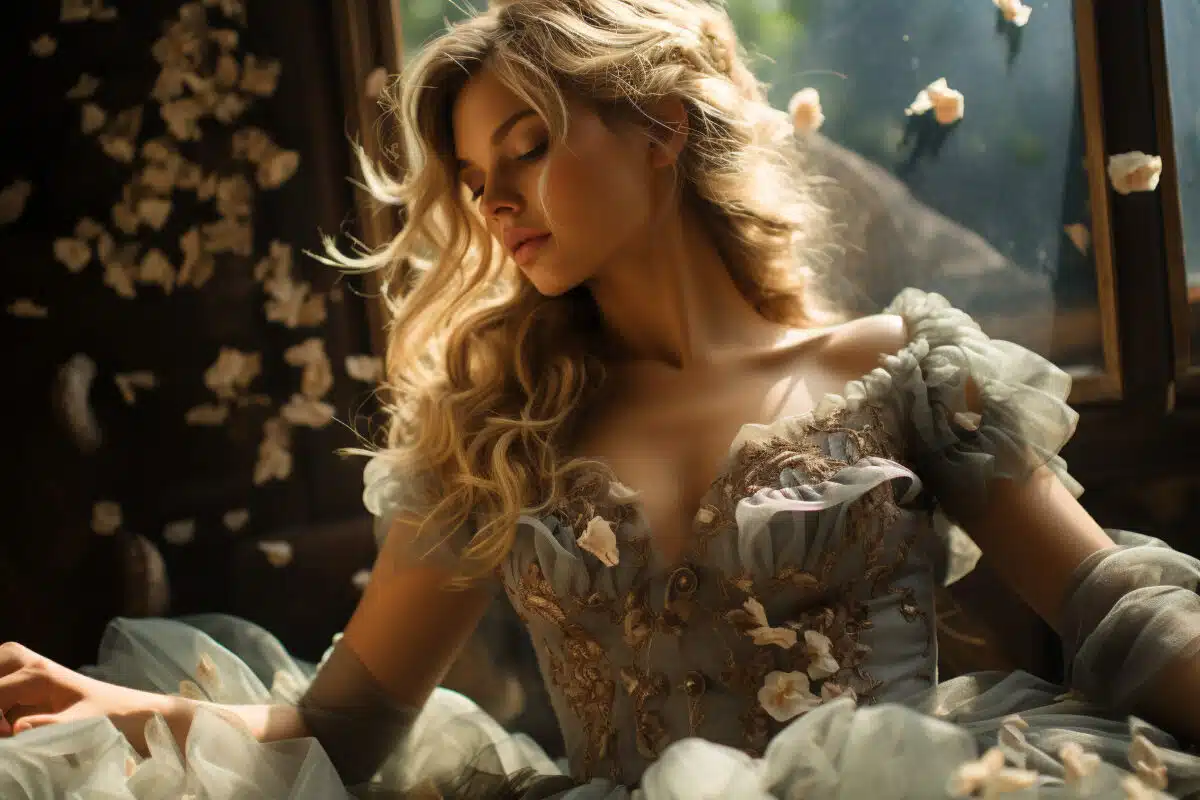
“Annabel Lee” by Edgar Allan Poe
It was many and many a year ago,
In a kingdom by the sea,
That a maiden there lived whom you may know
By the name of ANNABEL LEE;
And this maiden she lived with no other thought
Than to love and be loved by me.
I was a child and she was a child,
In this kingdom by the sea;
But we loved with a love that was more than love,
I and my Annabel Lee;
With a love that the winged seraphs of heaven
Coveted her and me.
And this was the reason that, long ago,
In this kingdom by the sea,
A wind blew out of a cloud, chilling
My beautiful Annabel Lee;
So that her highborn kinsman came
And bore her away from me,
To shut her up in a sepulchre
In this kingdom by the sea.
The angels, not half so happy in heaven,
Went envying her and me,
Yes!, that was the reason (as all men know,
In this kingdom by the sea)
That the wind came out of the cloud by night,
Chilling and killing my Annabel Lee.
But our love it was stronger by far than the love
Of those who were older than we,
Of many far wiser than we,
And neither the angels in heaven above,
Nor the demons down under the sea,
Can ever dissever my soul from the soul
Of the beautiful Annabel Lee.
For the moon never beams without bringing me dreams
Of the beautiful Annabel Lee;
And the stars never rise but I feel the bright eyes
Of the beautiful Annabel Lee;
And so, all the night-tide, I lie down by the side
Of my darling, my darling, my life and my bride,
In the sepulchre there by the sea,
In her tomb by the sounding sea.
“This Compost” by Walt Whitman
1.
Something startles me where I thought I was safest,
I withdraw from the still woods I loved,
I will not go now on the pastures to walk,
I will not strip the clothes from my body to meet my lover the sea,
I will not touch my flesh to the earth as to other flesh to renew me.
O how can it be that the ground itself does not sicken?
How can you be alive you growths of spring?
How can you furnish health you blood of herbs, roots, orchards, grain?
Are they not continually putting distemper’d corpses within you?
Is not every continent work’d over and over with sour dead?
Where have you disposed of their carcasses?
Those drunkards and gluttons of so many generations?
Where have you drawn off all the foul liquid and meat?
I do not see any of it upon you to-day, or perhaps I am deceiv’d,
I will run a furrow with my plough, I will press my spade through the sod and turn it up underneath,
I am sure I shall expose some of the foul meat.
2.
Behold this compost! behold it well!
Perhaps every mite has once form’d part of a sick person—yet behold!
The grass of spring covers the prairies,
The bean bursts noiselessly through the mould in the garden,
The delicate spear of the onion pierces upward,
The apple-buds cluster together on the apple-branches,
The resurrection of the wheat appears with pale visage out of its graves,
The tinge awakes over the willow-tree and the mulberry-tree,
The he-birds carol mornings and evenings while the she-birds sit on their nests,
The young of poultry break through the hatch’d eggs,
The new-born of animals appear, the calf is dropt from the cow, the colt from the mare,
Out of its little hill faithfully rise the potato’s dark green leaves,
Out of its hill rises the yellow maize-stalk, the lilacs bloom in the dooryards,
The summer growth is innocent and disdainful above all those strata of sour dead.
What chemistry!
That the winds are really not infectious,
That this is no cheat, this transparent green-wash of the sea which is so amorous after me,
That it is safe to allow it to lick my naked body all over with its tongues,
That it will not endanger me with the fevers that have deposited themselves in it,
That all is clean forever and forever,
That the cool drink from the well tastes so good,
That blackberries are so flavorous and juicy,
That the fruits of the apple-orchard and the orange-orchard, that melons, grapes, peaches, plums, will none of them poison me,
That when I recline on the grass I do not catch any disease,
Though probably every spear of grass rises out of what was once a catching disease.
Now I am terrified at the Earth, it is that calm and patient,
It grows such sweet things out of such corruptions,
It turns harmless and stainless on its axis, with such endless successions of diseas’d corpses,
It distills such exquisite winds out of such infused fetor,
It renews with such unwitting looks its prodigal, annual, sumptuous crops,
It gives such divine materials to men, and accepts such leavings from them at last.
“Accepted and Will Appear” by Parmenas Mix
One evening while reclining
In my easy-chair, repining
O’er the lack of true religion, and the dearth of common sense,
A solemn visaged lady,
Who was surely on the shady
Side of thirty, entered proudly, and to crush me did commence:
“I sent a poem here, sir,”
Said the lady, growing fiercer,
“And the subject which I’d chosen, you remember, sir, was ‘Spring’;
But, although I’ve scanned your paper,
Sir, by sunlight, gas, and taper,
I’ve discovered of that poem not a solitary thing.”
She was muscular and wiry,
And her temper sure was fiery,
And I knew to pacify her I would have to, fib like fun.
So I told her ere her verses,
Which were great, had come to, bless us,
We’d received just sixty-one on “Spring,” of which we’d printed one.
And I added, “We’ve decided
That they’d better be divided
Among the years that follow, one to each succeeding Spring.
So your work, I’m pleased to mention,
Will receive our best attention
In the year of nineteen-forty, when the birds begin to sing.”

“The Narrow Way” by Anne Bronte
Believe not those who say
The upward path is smooth,
Lest thou shouldst stumble in the way,
And faint before the truth.
It is the only road
Unto the realms of joy;
But he who seeks that blest abode
Must all his powers employ.
Bright hopes and pure delight
Upon his course may beam,
And there, amid the sternest heights,
The sweetest flowerets gleam.
On all her breezes borne,
Earth yields no scents like those;
But he that dares not gasp the thorn
Should never crave the rose.
Arm–arm thee for the fight!
Cast useless loads away;
Watch through the darkest hours of night;
Toil through the hottest day.
Crush pride into the dust,
Or thou must needs be slack;
And trample down rebellious lust,
Or it will hold thee back.
Seek not thy honour here;
Waive pleasure and renown;
The world’s dread scoff undaunted bear,
And face its deadliest frown.
To labour and to love,
To pardon and endure,
To lift thy heart to God above,
And keep thy conscience pure;
Be this thy constant aim,
Thy hope, thy chief delight;
What matter who should whisper blame
Or who should scorn or slight?
What matter, if thy God approve,
And if, within thy breast,
Thou feel the comfort of His love,
The earnest of His rest?
“Footsteps of Angels.” by Henry Wadsworth Longfellow
When the hours of Day are numbered,
And the voices of the Night
Wake the better soul, that slumbered,
To a holy, calm delight;
Ere the evening lamps are lighted,
And, like phantoms grim and tall,
Shadows from the fitful firelight
Dance upon the parlor wall;
Then the forms of the departed
Enter at the open door;
The beloved, the true-hearted,
Come to visit me once more;
He, the young and strong, who cherished
Noble longings for the strife,
By the roadside fell and perished,
Weary with the march of life!
They, the holy ones and weakly,
Who the cross of suffering bore,
Folded their pale hands so meekly,
Spake with us on earth no more!
And with them the Being Beauteous,
Who unto my youth was given,
More than all things else to love me,
And is now a saint in heaven.
With a slow and noiseless footstep
Comes that messenger divine,
Takes the vacant chair beside me,
Lays her gentle hand in mine.
And she sits and gazes at me
With those deep and tender eyes,
Like the stars, so still and saint-like,
Looking downward from the skies.
Uttered not, yet comprehended,
Is the spirit’s voiceless prayer,
Soft rebukes, in blessings ended,
Breathing from her lips of air.
Oh, though oft depressed and lonely,
All my fears are laid aside,
If I but remember only
Such as these have lived and died!
“Desiderata” by Max Ehrmann
Go placidly amid the noise and the haste,
and remember what peace there may be in silence.
As far as possible, without surrender,
be on good terms with all persons.
Speak your truth quietly and clearly;
and listen to others,
even to the dull and the ignorant;
they too have their story.
Avoid loud and aggressive persons;
they are vexatious to the spirit.
If you compare yourself with others,
you may become vain or bitter,
for always there will be greater and lesser persons than yourself.
Enjoy your achievements as well as your plans.
Keep interested in your own career, however humble;
it is a real possession in the changing fortunes of time.
Exercise caution in your business affairs,
for the world is full of trickery.
But let this not blind you to what virtue there is;
many persons strive for high ideals,
and everywhere life is full of heroism.
Be yourself. Especially do not feign affection.
Neither be cynical about love,
for in the face of all aridity and disenchantment,
it is as perennial as the grass.
Take kindly the counsel of the years,
gracefully surrendering the things of youth.
Nurture strength of spirit to shield you in sudden misfortune.
But do not distress yourself with dark imaginings.
Many fears are born of fatigue and loneliness.
Beyond a wholesome discipline,
be gentle with yourself.
You are a child of the universe
no less than the trees and the stars;
you have a right to be here.
And whether or not it is clear to you,
no doubt the universe is unfolding as it should.
Therefore be at peace with God,
whatever you conceive Him to be.
And whatever your labors and aspirations,
in the noisy confusion of life,
keep peace in your soul.
With all its sham, drudgery, and broken dreams,
it is still a beautiful world.
Be cheerful. Strive to be happy.

“Believe Me if All Those Endearing Young Charms.” by Thomas Moore
Believe me, if all those endearing young charms,
Which I gaze on so fondly today,
Were to change by to-morrow, and fleet in my arms,
Like fairy-gifts fading away,
Thou wouldst still be adored, as this moment thou art.
Let thy loveliness fade as it will.
And around the dear ruin each wish of my heart
Would entwine itself verdantly still.
It is not while beauty and youth are thine own,
And thy cheeks unprofaned by a tear,
That the fervor and faith of a soul can be known,
To which time will but make thee more dear;
No, the heart that has truly loved never forgets,
But as truly loves on to the close,
As the sun-flower turns on her god, when he sets,
The same look which she turned when he rose.
“The Consolation” by Anne Bronte
Though bleak these woods and damp the ground
With fallen leaves so thickly strewn,
And cold the wind that wanders round
With wild and melancholy moan,
There is a friendly roof I know
Might shield me from the wintry blast;
There is a fire whose ruddy glow
Will cheer me for my wanderings past.
And so, though still where’er I roam
Cold stranger glances meet my eye,
Though when my spirit sinks in woe
Unheeded swells the unbidden sigh,
Though solitude endured too long
Bids youthful joys too soon decay,
Makes mirth a stranger to my tongue
And overclouds my noon of day,
When kindly thoughts that would have way
Flow back discouraged to my breast
I know there is, though far away
A home where heart and soul may rest.
Warm hands are there that clasped in mine
The warmer heart will not belie,
While mirth and truth and friendship shine
In smiling lip and earnest eye.
The ice that gathers round my heart
May there be thawed; and sweetly then
The joys of youth that now depart
Will come to cheer my soul again.
Though far I roam, this thought shall be
My hope, my comfort everywhere;
While such a home remains to me
My heart shall never know despair.
Poems About Acceptance in Life

Step into a world of wisdom and reflection as these poems embrace life’s ups and downs with open arms.
Let these soothing words guide you towards acceptance and celebrate the beauty of every twist and turn in life.
“Reluctance” by Robert Frost
Out through the fields and the woods
And over the walls I have wended;
I have climbed the hills of view
And looked at the world, and descended;
I have come by the highway home,
And lo, it is ended.
The leaves are all dead on the ground,
Save those that the oak is keeping
To ravel them one by one
And let them go scraping and creeping
Out over the crusted snow,
When others are sleeping.
And the dead leaves lie huddled and still,
No longer blown hither and thither;
The last lone aster is gone;
The flowers of the witch hazel wither;
The heart is still aching to seek,
But the feet question ‘Whither?’
Ah, when to the heart of man
Was it ever less than a treason
To go with the drift of things,
To yield with a grace to reason,
And bow and accept the end
Of a love or a season?
“Few Get Enough” by Emily Dickinson
Few get enough, — enough is one;
To that ethereal throng
Have not each one of us the right
To stealthily belong?
“If….” by Rudyard Kipling
If you can keep your head when all about you
Are losing theirs and blaming it on you;
If you can trust yourself when all men doubt you,
But make allowance for their doubting too;
If you can wait and not be tired by waiting,
Or being lied about, don’t deal in lies,
Or being hated, don’t give way to hating,
And yet don’t look too good, nor talk too wise:
If you can dream, and not make dreams your master;
If you can think, and not make thoughts your aim;
If you can meet with Triumph and Disaster
And treat those two imposters just the same;
If you can bear to hear the truth you’ve spoken
Twisted by knaves to make a trap for fools,
Or watch the things you gave your life to, broken,
And stoop and build ’em up with worn-out tools;
If you can talk with crowds and keep your virtue,
Or walk with kings, nor lose the common touch,
If neither foes nor loving friends can hurt you,
If all men count with you, but none too much;
If you can fill the unforgiving minute
With sixty seconds’ worth of distance run,
Yours is the Earth and everything that’s in it,
And, which is more, you’ll be a Man, my son!
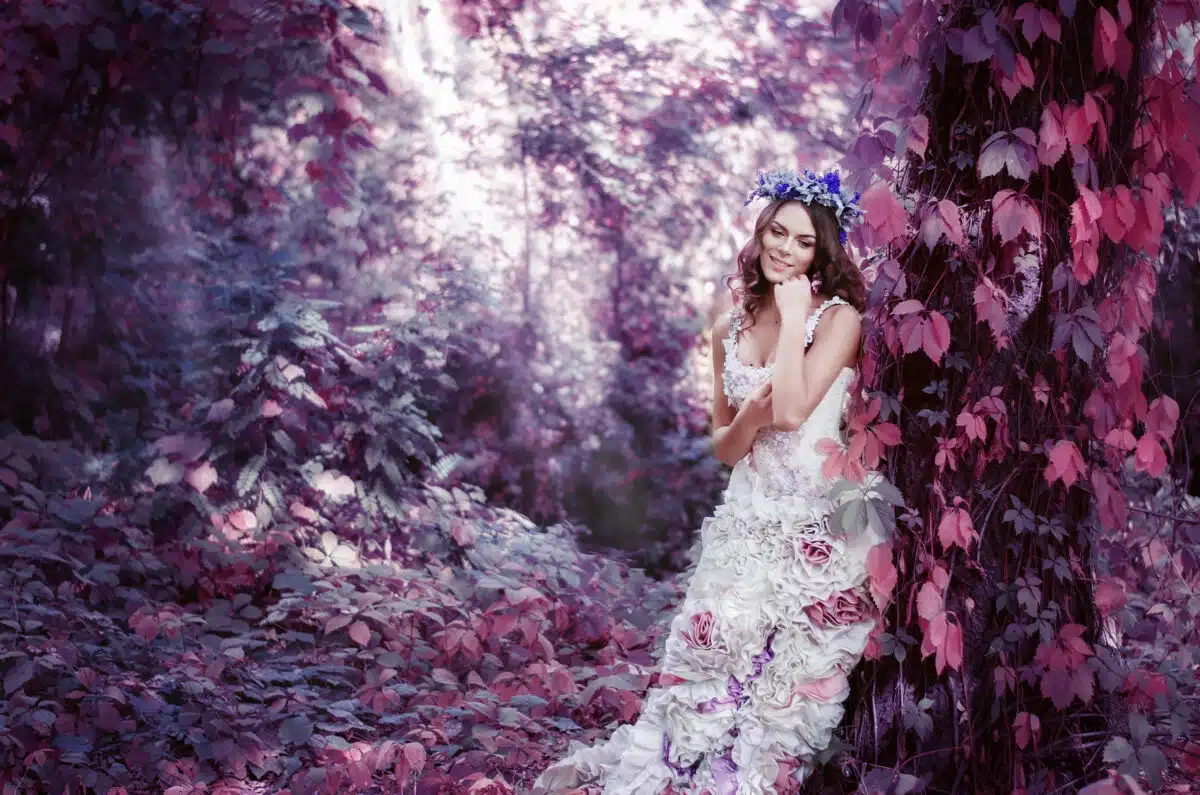
“On Pain” by Kahlil Gibran
And a woman spoke, saying, Tell us of Pain.
And he said:
Your pain is the breaking of the shell that encloses your understanding.
Even as the stone of the fruit must break, that its heart may stand in the sun, so must you know pain.
And could you keep your heart in wonder at the daily miracles of your life your pain would not seem less wondrous than your joy;
And you would accept the seasons of your heart, even as you have always accepted the seasons that pass over your fields.
And you would watch with serenity through the winters of your grief.
Much of your pain is self-chosen.
It is the bitter potion by which the physician within you heals your sick self.
Therefore trust the physician, and drink his remedy in silence and tranquility:
For his hand, though heavy and hard, is guided by the tender hand of the Unseen,
And the cup he brings, though it burn your lips, has been fashioned of the clay which the Potter has moistened with His own sacred tears.
“Life.” by Charlotte Bronte
Life, believe, is not a dream
So dark as sages say;
Oft a little morning rain
Foretells a pleasant day.
Sometimes there are clouds of gloom,
But these are transient all;
If the shower will make the roses bloom,
O why lament its fall?
Rapidly, merrily,
Life’s sunny hours flit by,
Gratefully, cheerily
Enjoy them as they fly!
What though Death at times steps in,
And calls our Best away?
What though sorrow seems to win,
O’er hope, a heavy sway?
Yet Hope again elastic springs,
Unconquered, though she fell;
Still buoyant are her golden wings,
Still strong to bear us well.
Manfully, fearlessly,
The day of trial bear,
For gloriously, victoriously,
Can courage quell despair!
“The Rainy Day” by Henry Wadsworth Longfellow
The day is cold, and dark, and dreary
It rains, and the wind is never weary;
The vine still clings to the mouldering wall,
But at every gust the dead leaves fall,
And the day is dark and dreary.
My life is cold, and dark, and dreary;
It rains, and the wind is never weary;
My thoughts still cling to the mouldering Past,
But the hopes of youth fall thick in the blast,
And the days are dark and dreary.
Be still, sad heart! and cease repining;
Behind the clouds is the sun still shining;
Thy fate is the common fate of all,
Into each life some rain must fall,
Some days must be dark and dreary.
Poems About Acceptance of Death
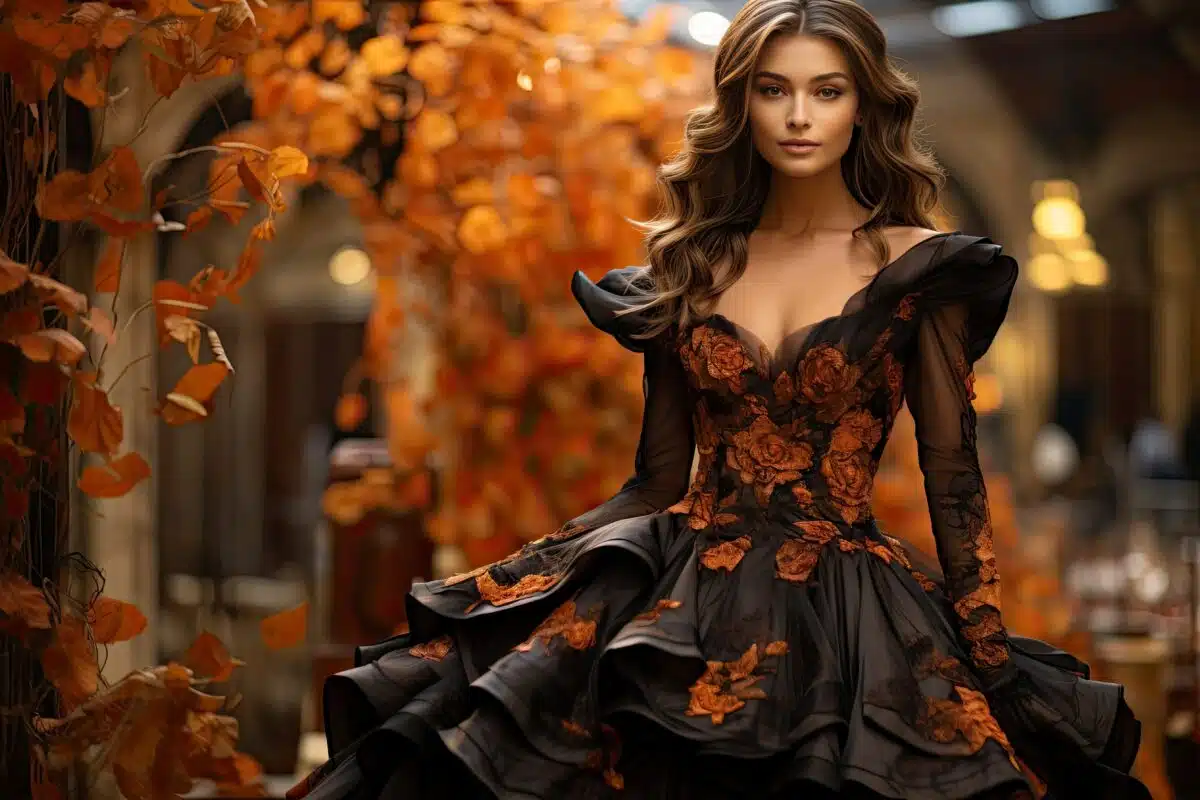
Embrace the bittersweet dance of life and death as these poems whisk you to a realm where shadows and sunlight intertwine, and acceptance blooms like a delicate flower on a moonlit night.
Dive into this collection of heartfelt verses that explore the enigmatic beauty of embracing the inevitable, where life’s final chapter becomes a graceful waltz.
“Lucinda Matlock” by Edgar Lee Masters
I went to the dances at Chandlerville,
And played snap-out at Winchester.
One time we changed partners,
Driving home in the moonlight of middle June,
And then I found Davis.
We were married and lived together for seventy years,
Enjoying, working, raising the twelve children,
Eight of whom we lost
Ere I had reached the age of sixty.
I spun,
I wove,
I kept the house,
I nursed the sick,
I made the garden, and for holiday
Rambled over the fields where sang the larks,
And by Spoon River gathering many a shell,
And many a flower and medicinal weed –
Shouting to the wooded hills, singing to the green valleys.
At ninety – six I had lived enough, that is all,
And passed to a sweet repose.
What is this I hear of sorrow and weariness,
Anger, discontent and drooping hopes?
Degenerate sons and daughters,
Life is too strong for you –
It takes life to love Life.
“Easter” by William Butler Yeats
I have met them at close of day
Coming with vivid faces
From counter or desk among grey
Eighteenth-century houses.
I have passed with a nod of the head
Or polite meaningless words,
Or have lingered awhile and said
Polite meaningless words,
And thought before I had done
Of a mocking tale or a gibe
To please a companion
Around the fire at the club,
Being certain that they and I
But lived where motley is worn:
All changed, changed utterly:
A terrible beauty is born.
That woman’s days were spent
In ignorant good-will,
Her nights in argument
Until her voice grew shrill.
What voice more sweet than hers
When, young and beautiful,
She rode to harriers?
This man had kept a school
And rode our winged horse;
This other his helper and friend
Was coming into his force;
He might have won fame in the end,
So sensitive his nature seemed,
So daring and sweet his thought.
This other man I had dreamed
A drunken, vainglorious lout.
He had done most bitter wrong
To some who are near my heart,
Yet I number him in the song;
He, too, has resigned his part
In the casual comedy;
He, too, has been changed in his turn,
Transformed utterly:
A terrible beauty is born.
Hearts with one purpose alone
Through summer and winter seem
Enchanted to a stone
To trouble the living stream.
The horse that comes from the road.
The rider, the birds that range
From cloud to tumbling cloud,
Minute by minute they change;
A shadow of cloud on the stream
Changes minute by minute;
A horse-hoof slides on the brim,
And a horse plashes within it;
The long-legged moor-hens dive,
And hens to moor-cocks call;
Minute by minute they live:
The stone’s in the midst of all.
Too long a sacrifice
Can make a stone of the heart.
O when may it suffice?
That is Heaven’s part, our part
To murmur name upon name,
As a mother names her child
When sleep at last has come
On limbs that had run wild.
What is it but nightfall?
No, no, not night but death;
Was it needless death after all?
For England may keep faith
For all that is done and said.
We know their dream; enough
To know they dreamed and are dead;
And what if excess of love
Bewildered them till they died?
I write it out in a verse,
MacDonagh and MacBride
And Connolly and Pearse
Now and in time to be,
Wherever green is worn,
Are changed, changed utterly:
A terrible beauty is born.
“Fletcher McGee” by Edgar Lee Masters
She took my strength by minutes,
She took my life by hours,
She drained me like a fevered moon
That saps the spinning world.
The days went by like shadows,
The minutes wheeled like stars.
She took the pity from my heart,
And made it into smiles.
She was a hunk of sculptor’s clay,
My secret thoughts were fingers:
They flew behind her pensive brow
And lined it deep with pain.
They set the lips, and sagged the cheeks,
And drooped the eye with sorrow.
My soul had entered in the clay,
Fighting like seven devils.
It was not mine, it was not hers;
She held it, but its struggles
Modeled a face she hated,
And a face I feared to see.
I beat the windows, shook the bolts.
I hid me in a corner
And then she died and haunted me,
And hunted me for life.

“No Coward Soul Is Mine” by Emily Bronte
No coward soul is mine,
No trembler in the world,s storm-troubled sphere:
I see Heaven’s glories shine,
And Faith shines equal arming me from Fear.
O God within my breast.
Almighty ever-present Deity!
Life, that in me has rest,
As I Undying Life, have power in thee!
Vain are the thousand creeds
That move men’s hearts, unutterably vain;
Worthless as withered weeds,
Or idlest froth amid the boundless main,
To waken doubt in one
Holding so fast by Thy infinity;
So surely anchored on
The steadfast rock of Immortality.
With wide-embracing love
Thy Spirit animates eternal years,
Pervades and broods above,
Changes, sustains, dissolves, creates, and rears.
Though Earth and moon were gone,
And suns and universes ceased to be,
And Thou wert left alone,
Every Existence would exist in thee.
There is not room for Death,
Nor atom that his might could render void:
Since thou art Being and Breath,
And what thou art may never be destroyed.
Famous Poems About Accepting Yourself

Step into a world where self-acceptance reigns supreme, as these famous poems gently remind readers to embrace our quirks, flaws, and all those little things that make us beautifully unique.
Get ready to dance to the rhythm of self-love and rediscover the joy of being unapologetically you.
“Sonnets From the Portuguese XIV” by Elizabeth Barrett Browning
If thou must love me, let it be for nought
Except for love’s sake only. Do not say
I love her for her smile … her look … her way
Of speaking gently, … for a trick of thought
That falls in well with mine, and certes brought
A sense of pleasant ease on such a day’—
For these things in themselves, Belovèd, may
Be changed, or change for thee,—and love, so wrought,
May be unwrought so. Neither love me for
Thine own dear pity’s wiping my cheeks dry,—
A creature might forget to weep, who bore
Thy comfort long, and lose thy love thereby!
But love me for love’s sake, that evermore
Thou may’st love on, through love’s eternity.
“Invictus” by William Ernest Henley
Out of the night that covers me,
Black as the pit from pole to pole,
I thank whatever gods may be
for my unconquerable soul.
In the fell clutch of circumstance
I have not winced nor cried aloud.
Under the bludgeonings of chance
My head is bloody, but unbowed.
Beyond this place of wrath and tears
Looms but the Horror of the shade,
And yet the menace of the years
Finds and shall find me unafraid.
It matters not how strait the gate,
How charged with punishments the scroll,
I am the master of my fate:
I am the captain of my soul.
“George Gray” by Edgar Lee Masters
I have studied many times
The marble which was chiseled for me –
A boat with a furled sail at rest in a harbor.
In truth it pictures not my destination
But my life.
For love was offered me and I shrank from its disillusionment;
Sorrow knocked at my door, but I was afraid;
Ambition called to me, but I dreaded the chances.
Yet all the while I hungered for meaning in my life.
And now I know that we must lift the sail
And catch the winds of destiny
Wherever they drive the boat.
To put meaning in one’s life may end in madness,
But life without meaning is the torture
Of restlessness and vague desire –
It is a boat longing for the sea and yet afraid.

“Renascence” by Edna St. Vincent Millay
All I could see from where I stood
Was three long mountains and a wood;
I turned and looked another way,
And saw three islands in a bay.
So with my eyes I traced the line
Of the horizon, thin and fine,
Straight around till I was come
Back to where I’d started from;
And all I saw from where I stood
Was three long mountains and a wood.
Over these things I could not see;
These were the things that bounded me;
And I could touch them with my hand,
Almost, I thought, from where I stand.
And all at once things seemed so small
My breath came short, and scarce at all.
But, sure, the sky is big, I said;
Miles and miles above my head;
So here upon my back I’ll lie
And look my fill into the sky.
And so I looked, and, after all,
The sky was not so very tall.
The sky, I said, must somewhere stop,
And–sure enough!–I see the top!
The sky, I thought, is not so grand;
I ‘most could touch it with my hand!
And reaching up my hand to try,
I screamed to feel it touch the sky.
I screamed, and–lo!–Infinity
Came down and settled over me;
Forced back my scream into my chest,
Bent back my arm upon my breast,
And, pressing of the Undefined
The definition on my mind,
Held up before my eyes a glass
Through which my shrinking sight did pass
Until it seemed I must behold
Immensity made manifold;
Whispered to me a word whose sound
Deafened the air for worlds around,
And brought unmuffled to my ears
The gossiping of friendly spheres,
The creaking of the tented sky,
The ticking of Eternity.
I saw and heard, and knew at last
The How and Why of all things, past,
And present, and forevermore.
The Universe, cleft to the core,
Lay open to my probing sense
That, sick’ning, I would fain pluck thence
But could not,–nay! But needs must suck
At the great wound, and could not pluck
My lips away till I had drawn
All venom out.–Ah, fearful pawn!
For my omniscience paid I toll
In infinite remorse of soul.
All sin was of my sinning, all
Atoning mine, and mine the gall
Of all regret. Mine was the weight
Of every brooded wrong, the hate
That stood behind each envious thrust,
Mine every greed, mine every lust.
And all the while for every grief,
Each suffering, I craved relief
With individual desire,–
Craved all in vain! And felt fierce fire
About a thousand people crawl;
Perished with each,–then mourned for all!
A man was starving in Capri;
He moved his eyes and looked at me;
I felt his gaze, I heard his moan,
And knew his hunger as my own.
I saw at sea a great fog bank
Between two ships that struck and sank;
A thousand screams the heavens smote;
And every scream tore through my throat.
No hurt I did not feel, no death
That was not mine; mine each last breath
That, crying, met an answering cry
From the compassion that was I.
All suffering mine, and mine its rod;
Mine, pity like the pity of God.
Ah, awful weight! Infinity
Pressed down upon the finite Me!
My anguished spirit, like a bird,
Beating against my lips I heard;
Yet lay the weight so close about
There was no room for it without.
And so beneath the weight lay I
And suffered death, but could not die.
Long had I lain thus, craving death,
When quietly the earth beneath
Gave way, and inch by inch, so great
At last had grown the crushing weight,
Into the earth I sank till I
Full six feet under ground did lie,
And sank no more,–there is no weight
Can follow here, however great.
From off my breast I felt it roll,
And as it went my tortured soul
Burst forth and fled in such a gust
That all about me swirled the dust.
Deep in the earth I rested now;
Cool is its hand upon the brow
And soft its breast beneath the head
Of one who is so gladly dead.
And all at once, and over all
The pitying rain began to fall;
I lay and heard each pattering hoof
Upon my lowly, thatched roof,
And seemed to love the sound far more
Than ever I had done before.
For rain it hath a friendly sound
To one who’s six feet underground;
And scarce the friendly voice or face:
A grave is such a quiet place.
The rain, I said, is kind to come
And speak to me in my new home.
I would I were alive again
To kiss the fingers of the rain,
To drink into my eyes the shine
Of every slanting silver line,
To catch the freshened, fragrant breeze
From drenched and dripping apple-trees.
For soon the shower will be done,
And then the broad face of the sun
Will laugh above the rain-soaked earth
Until the world with answering mirth
Shakes joyously, and each round drop
Rolls, twinkling, from its grass-blade top.
How can I bear it; buried here,
While overhead the sky grows clear
And blue again after the storm?
O, multi-colored, multiform,
Beloved beauty over me,
That I shall never, never see
Again! Spring-silver, autumn-gold,
That I shall never more behold!
Sleeping your myriad magics through,
Close-sepulchred away from you!
O God, I cried, give me new birth,
And put me back upon the earth!
Upset each cloud’s gigantic gourd
And let the heavy rain, down-poured
In one big torrent, set me free,
Washing my grave away from me!
I ceased; and through the breathless hush
That answered me, the far-off rush
Of herald wings came whispering
Like music down the vibrant string
Of my ascending prayer, and–crash!
Before the wild wind’s whistling lash
The startled storm-clouds reared on high
And plunged in terror down the sky,
And the big rain in one black wave
Fell from the sky and struck my grave.
I know not how such things can be;
I only know there came to me
A fragrance such as never clings
To aught save happy living things;
A sound as of some joyous elf
Singing sweet songs to please himself,
And, through and over everything,
A sense of glad awakening.
The grass, a-tiptoe at my ear,
Whispering to me I could hear;
I felt the rain’s cool finger-tips
Brushed tenderly across my lips,
Laid gently on my sealed sight,
And all at once the heavy night
Fell from my eyes and I could see,–
A drenched and dripping apple-tree,
A last long line of silver rain,
A sky grown clear and blue again.
And as I looked a quickening gust
Of wind blew up to me and thrust
Into my face a miracle
Of orchard-breath, and with the smell,–
I know not how such things can be!–
I breathed my soul back into me.
Ah! Up then from the ground sprang I
And hailed the earth with such a cry
As is not heard save from a man
Who has been dead, and lives again.
About the trees my arms I wound;
Like one gone mad I hugged the ground;
I raised my quivering arms on high;
I laughed and laughed into the sky,
Till at my throat a strangling sob
Caught fiercely, and a great heart-throb
Sent instant tears into my eyes;
O God, I cried, no dark disguise
Can e’er hereafter hide from me
Thy radiant identity!
Thou canst not move across the grass
But my quick eyes will see Thee pass,
Nor speak, however silently,
But my hushed voice will answer Thee.
I know the path that tells Thy way
Through the cool eve of every day;
God, I can push the grass apart
And lay my finger on Thy heart!
The world stands out on either side
No wider than the heart is wide;
Above the world is stretched the sky,–
No higher than the soul is high.
The heart can push the sea and land
Farther away on either hand;
The soul can split the sky in two,
And let the face of God shine through.
But East and West will pinch the heart
That can not keep them pushed apart;
And he whose soul is flat–the sky
Will cave in on him by and by.
“A Musical Instrument” by Elizabeth Barrett Browning
I.
What was he doing, the great god Pan,
Down in the reeds by the river?
Spreading ruin and scattering ban,
Splashing and paddling with hoofs of a goat,
And breaking the golden lilies afloat
With the dragon-fly on the river.
II.
He tore out a reed, the great god Pan,
From the deep cool bed of the river:
The limpid water turbidly ran,
And the broken lilies a-dying lay,
And the dragon-fly had fled away,
Ere he brought it out of the river.
III.
High on the shore sate the great god Pan,
While turbidly flowed the river;
And hacked and hewed as a great god can,
With his hard bleak steel at the patient reed,
Till there was not a sign of a leaf indeed
To prove it fresh from the river.
IV.
He cut it short, did the great god Pan,
(How tall it stood in the river!)
Then drew the pith, like the heart of a man,
Steadily from the outside ring,
And notched the poor dry empty thing
In holes, as he sate by the river.
V.
This is the way,’ laughed the great god Pan,
Laughed while he sate by the river,)
The only way, since gods began
To make sweet music, they could succeed.’
Then, dropping his mouth to a hole in the reed,
He blew in power by the river.
VI.
Sweet, sweet, sweet, O Pan!
Piercing sweet by the river!
Blinding sweet, O great god Pan!
The sun on the hill forgot to die,
And the lilies revived, and the dragon-fly
Came back to dream on the river.
VII.
Yet half a beast is the great god Pan,
To laugh as he sits by the river,
Making a poet out of a man:
The true gods sigh for the cost and pain,
For the reed which grows nevermore again
As a reed with the reeds in the river.
Poems About Acceptance of Others

Take a poetic journey through the realms of understanding and compassion as these heartfelt verses embrace the beauty of accepting others just as they are.
Let these words awaken your empathy and open your heart to a world where differences are celebrated and acceptance knows no bounds.
“Gitanjali 14” by Rabindranath Tagore
My desires are many and my cry is pitiful, but ever didst thou save me by hard refusals; and this strong mercy has been wrought into my life through and through.
Day by day thou art making me worthy of the simple, great gifts that thou gavest to me unasked—this sky and the light, this body and the life and the mind—saving me from perils of overmuch desire.
There are times when I languidly linger and times when I awaken and hurry in search of my goal; but cruelly thou hidest thyself from before me.
Day by day thou art making me worthy of thy full acceptance by refusing me ever and anon, saving me from perils of weak, uncertain desire.
“The Song of the Chattahoochee” by Sidney Lanier
Out of the hills of Habersham,
Down the valleys of Hall,
I hurry amain to reach the plain,
Run the rapid and leap the fall,
Split at the rock and together again,
Accept my bed, or narrow or wide,
And flee from folly on every side
With a lover’s pain to attain the plain
Far from the hills of Habersham,
Far from the valleys of Hall.
All down the hills of Habersham,
All through the valleys of Hall,
The rushes cried ‘Abide, abide,’
The willful waterweeds held me thrall,
The laving laurel turned my tide,
The ferns and the fondling grass said ‘Stay,’
The dewberry dipped for to work delay,
And the little reeds sighed ‘Abide, abide,
Here in the hills of Habersham,
Here in the valleys of Hall.’
High o’er the hills of Habersham,
Veiling the valleys of Hall,
The hickory told me manifold
Fair tales of shade, the poplar tall
Wrought me her shadowy self to hold,
The chestnut, the oak, the walnut, the pine,
Overleaning, with flickering meaning and sign,
Said, ‘Pass not, so cold, these manifold
Deep shades of the hills of Habersham,
These glades in the valleys of Hall.’
And oft in the hills of Habersham,
And oft in the valleys of Hall,
The white quartz shone, and the smooth brook-stone
Did bar me of passage with friendly brawl,
And many a luminous jewel lone
— Crystals clear or a-cloud with mist,
Ruby, garnet and amethyst —
Made lures with the lights of streaming stone
In the clefts of the hills of Habersham,
In the beds of the valleys of Hall.
But oh, not the hills of Habersham,
And oh, not the valleys of Hall
Avail: I am fain for to water the plain.
Downward the voices of Duty call —
Downward, to toil and be mixed with the main,
The dry fields burn, and the mills are to turn,
And a myriad flowers mortally yearn,
And the lordly main from beyond the plain
Calls o’er the hills of Habersham,
Calls through the valleys of Hall.
“The Mystic’s Christmas” by John Greenleaf Whittier
“All hail!” the bells of Christmas rang,
“All hail!” the monks at Christmas sang,
The merry monks who kept with cheer
The gladdest day of all their year.
But still apart, unmoved thereat,
A pious elder brother sat
Silent, in his accustomed place,
With God’s sweet peace upon his face.
“Why sitt’st thou thus?” his brethren cried,
“It is the blessed Christmas-tide;
The Christmas lights are all aglow,
The sacred lilies bud and blow.
“Above our heads the joy-bells ring,
Without the happy children sing,
And all God’s creatures hail the morn
On which the holy Christ was born.
“Rejoice with us; no more rebuke
Our gladness with thy quiet look.”
The gray monk answered, “Keep, I pray,
Even as ye list, the Lord’s birthday.
“Let heathen Yule fires flicker red
Where thronged refectory feasts are spread;
With mystery-play and masque and mime
And wait-songs speed the holy time!
“The blindest faith may haply save;
The Lord accepts the things we have;
And reverence, howsoe’er it strays,
May find at last the shining ways.
“They needs must grope who cannot see,
The blade before the ear must be;
As ye are feeling I have felt,
And where ye dwell I too have dwelt.
“But now, beyond the things of sense,
Beyond occasions and events,
I know, through God’s exceeding grace,
Release from form and time and space.
“I listen, from no mortal tongue,
To hear the song the angels sung;
And wait within myself to know
The Christmas lilies bud and blow.
“The outward symbols disappear
From him whose inward sight is clear;
And small must be the choice of days
To him who fills them all with praise!
“Keep while you need it, brothers mine,
With honest seal your Christmas sign,
But judge not him who every morn
Feels in his heart the Lord Christ born!”
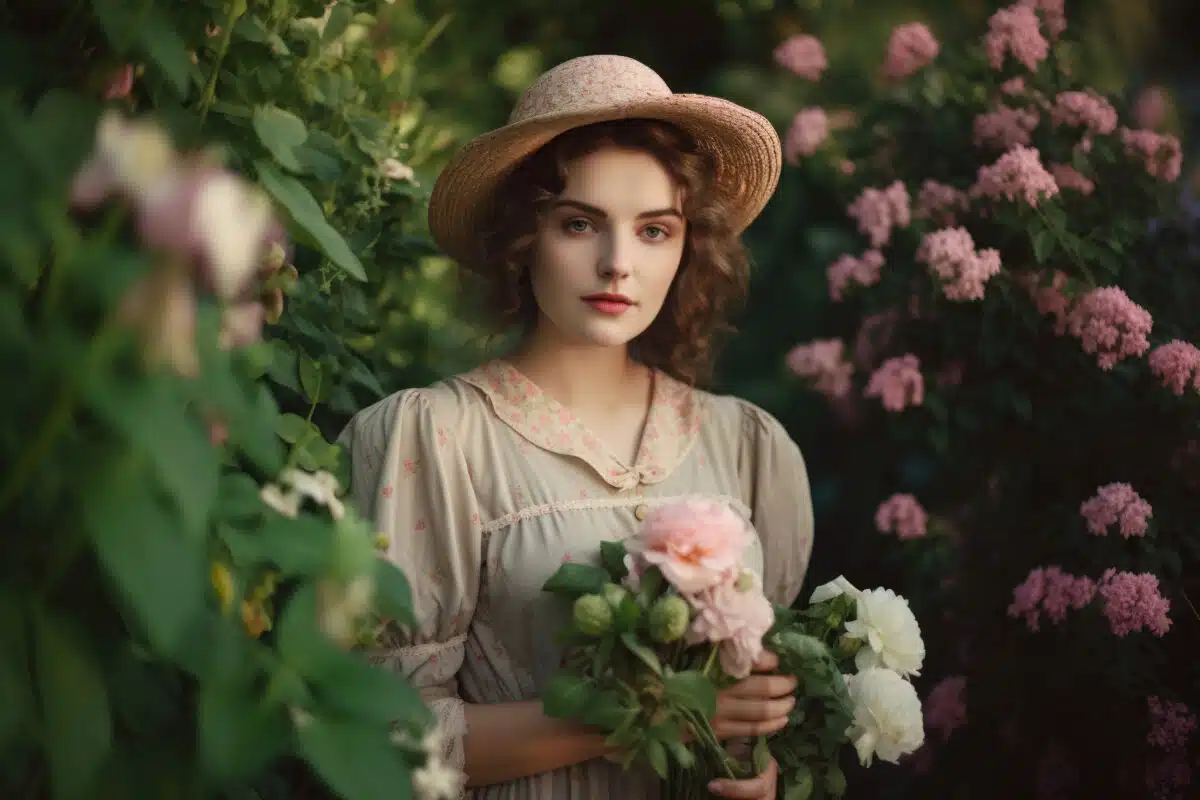
“To My Mother” by Christina Rossetti
To-day’s your natal day;
Sweet flowers I bring:
Mother, accept, I pray
My offering.
And may you happy live,
And long us bless;
Receiving as you give
Great happiness.
“The Solitary Reaper” by William Wordsworth
Behold her, single in the field,
Yon solitary Highland Lass!
Reaping and singing by herself;
Stop here, or gently pass!
Alone she cuts and binds the grain,
And sings a melancholy strain;
O listen! for the Vale profound
Is overflowing with the sound.
No Nightingale did ever chaunt
More welcome notes to weary bands
Of travellers in some shady haunt,
Among Arabian sands:
A voice so thrilling ne’er was heard
In spring-time from the Cuckoo-bird,
Breaking the silence of the seas
Among the farthest Hebrides.
Will no one tell me what she sings?
Perhaps the plaintive numbers flow
For old, unhappy, far-off things,
And battles long ago:
Or is it some more humble lay,
Familiar matter of to-day?
Some natural sorrow, loss, or pain,
That has been, and may be again?
Whate’er the theme, the Maiden sang
As if her song could have no ending;
I saw her singing at her work,
And o’er the sickle bending;
I listened, motionless and still;
And, as I mounted up the hill,
The music in my heart I bore,
Long after it was heard no more.
“Whoever Hath Her Wish, Thou Hast Thy ‘Will,’ (Sonnet 135)” by William Shakespeare
Whoever hath her wish, thou hast thy ‘Will,’
And ‘Will’ to boot, and ‘Will’ in overplus;
More than enough am I that vex thee still,
To thy sweet will making addition thus.
Wilt thou, whose will is large and spacious,
Not once vouchsafe to hide my will in thine?
Shall will in others seem right gracious,
And in my will no fair acceptance shine?
The sea, all water, yet receives rain still
And in abundance addeth to his store;
So thou, being rich in ‘Will,’ added to thy ‘Will’
One will of mine, to make thy large ‘Will’ more.
Let no unkind, no fair beseechers kill;
Think all but one, and me in that one ‘Will.’

“Presentiment.” by Charlotte Bronte
“Sister, you’ve sat there all the day,
Come to the hearth awhile;
The wind so wildly sweeps away,
The clouds so darkly pile.
That open book has lain, unread,
For hours upon your knee;
You’ve never smiled nor turned your head;
What can you, sister, see?”
“Come hither, Jane, look down the field;
How dense a mist creeps on!
The path, the hedge, are both concealed,
Ev’n the white gate is gone
No landscape through the fog I trace,
No hill with pastures green;
All featureless is Nature’s face.
All masked in clouds her mien.
“Scarce is the rustle of a leaf
Heard in our garden now;
The year grows old, its days wax brief,
The tresses leave its brow.
The rain drives fast before the wind,
The sky is blank and grey;
O Jane, what sadness fills the mind
On such a dreary day!”
“You think too much, my sister dear;
You sit too long alone;
What though November days be drear?
Full soon will they be gone.
I’ve swept the hearth, and placed your chair.
Come, Emma, sit by me;
Our own fireside is never drear,
Though late and wintry wane the year,
Though rough the night may be.”
“The peaceful glow of our fireside
Imparts no peace to me:
My thoughts would rather wander wide
Than rest, dear Jane, with thee.
I’m on a distant journey bound,
And if, about my heart,
Too closely kindred ties were bound,
‘Twould break when forced to part.
“‘Soon will November days be o’er:’
Well have you spoken, Jane:
My own forebodings tell me more–
For me, I know by presage sure,
They’ll ne’er return again.
Ere long, nor sun nor storm to me
Will bring or joy or gloom;
They reach not that Eternity
Which soon will be my home.”
Eight months are gone, the summer sun
Sets in a glorious sky;
A quiet field, all green and lone,
Receives its rosy dye.
Jane sits upon a shaded stile,
Alone she sits there now;
Her head rests on her hand the while,
And thought o’ercasts her brow.
She’s thinking of one winter’s day,
A few short months ago,
Then Emma’s bier was borne away
O’er wastes of frozen snow.
She’s thinking how that drifted snow
Dissolved in spring’s first gleam,
And how her sister’s memory now
Fades, even as fades a dream.
The snow will whiten earth again,
But Emma comes no more;
She left, ‘mid winter’s sleet and rain,
This world for Heaven’s far shore.
On Beulah’s hills she wanders now,
On Eden’s tranquil plain;
To her shall Jane hereafter go,
She ne’er shall come to Jane!
